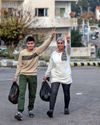
IN THE ORDINARY WAY OF THINGS, WHEN PEOPLE SAY THAT THEY ARE GIVING UP, they are usually referring to something like smoking, or alcohol, or chocolate, or any of the other anaesthetic pleasures of everyday life; they are not, on the whole, talking about suicide (though people do tend to want to give up only their supposedly self-harming habits).
Giving up certain things may be good for us, and yet the idea of someone just giving up is never appealing. Like alcoholics who need everybody to drink, there tends to be a determined cultural consensus that life is, and has to be, worth living (if not, of course, actually sacred).
There are, to put it as simply as possible, what turn out to be good and bad sacrifices (and sacrifice creates the illusion - or reassures us - that we can choose our losses). There is the giving up that we can admire and aspire to, and the giving up that profoundly unsettles us. What, for example, does real hope or real despair require us to relinquish? What exactly do we imagine we are doing when we give something up? There is an essential and far-reaching ambiguity to this simple idea. We give things up when we believe we can change; we give up when we believe we can't.
All the new thinking, like all the old thinking, is about sacrifice, about what we should give up to get the lives we should want. For our health, for our planet, for our emotional and moral wellbeing we are asked to give up a great deal now. But alongside this orgy of improving selfsacrifices there is a despair and terror of just wanting to give up. A need to keep at bay the sense that life may not be worth the struggle, the struggle that religions and therapies and education, and entertainment, and commodities, are there to help us with. For more and more people now it seems that it is their hatred and their prejudice and their scapegoating that actually keeps them going.
この記事は The Guardian Weekly の January 12, 2024 版に掲載されています。
7 日間の Magzter GOLD 無料トライアルを開始して、何千もの厳選されたプレミアム ストーリー、9,000 以上の雑誌や新聞にアクセスしてください。
すでに購読者です ? サインイン
この記事は The Guardian Weekly の January 12, 2024 版に掲載されています。
7 日間の Magzter GOLD 無料トライアルを開始して、何千もの厳選されたプレミアム ストーリー、9,000 以上の雑誌や新聞にアクセスしてください。
すでに購読者です? サインイン

AI has made the move into video and it's worryingly plausible
I recently had the opportunity to see a demo of Sora, OpenAI's video generation tool, which was released in the US last Monday, and it was so impressive it made me worried for the future.

With tyrant Assad ousted, Syrians deserve support and hope
Last week, time collapsed. Bashar al-Assad's fall recalled scenes across the region from the start of the Arab spring almost 14 years ago. Suddenly history felt vivid, its memories sharpened. In fact it no longer felt like history.

TV
The Guardian Weekly team reveals our small-screen picks of the year, from the underground vaults of post-apocalyptic Fallout to the mile-high escapism of Rivals

Albums
Murky love stories, nostalgic pop and an in-your-face masterpiece captured our critics' ears in 2024

Trailblazers The inspiring people we met around the world this year
From an exuberant mountaineer to a woman defiantly facing the guns of war, here are some of the brave individuals who gave us hope in a tumultuous 2024

Out of touch How president sealed his own fate in martial law gambit
For Yoon Suk Yeol, this month's short-lived martial law declaration wasn't just a catastrophic miscalculation - it was the culmination of a presidency that had been troubled from the start.

Son of the soil Who is François Bayrou, the farmer turned prime minister?
François Bayrou, the new French prime minister, calls himself a country man. A tractor-driving \"son of the soil\" and breeder of thoroughbreds, he has run for president three times, saying his rural roots and centrist politics led him to try to find common ground between left and right.

Power plant workers keeping the lights on
The Guardian Weekly visits a Soviet-era coal-fired thermal installation to learn how it has held up to Russian attacks

'We fear new oppression' Alawites worry over rebel rule
To prepare khubeiza, the leaves of the kale-like plant must be roughly chopped and sauteed with onions, garlic and a dash of salt. According to folklore, the recipe originated among the Alawite communities who lived in Syria's mountainous coastline where the fibrous, wild-growing plant can be found in abundance. So poor were the Alawites in Ottoman times, the story goes, that the only food they could find to eat was khubeiza, which sprouts like a stubborn weed every spring.

'Gisèle is waiting for explanations'
The Pelicot rape trial has horrified the world. But as it comes to an end, the questions it has raised about French society and rape culture have still not been answered.